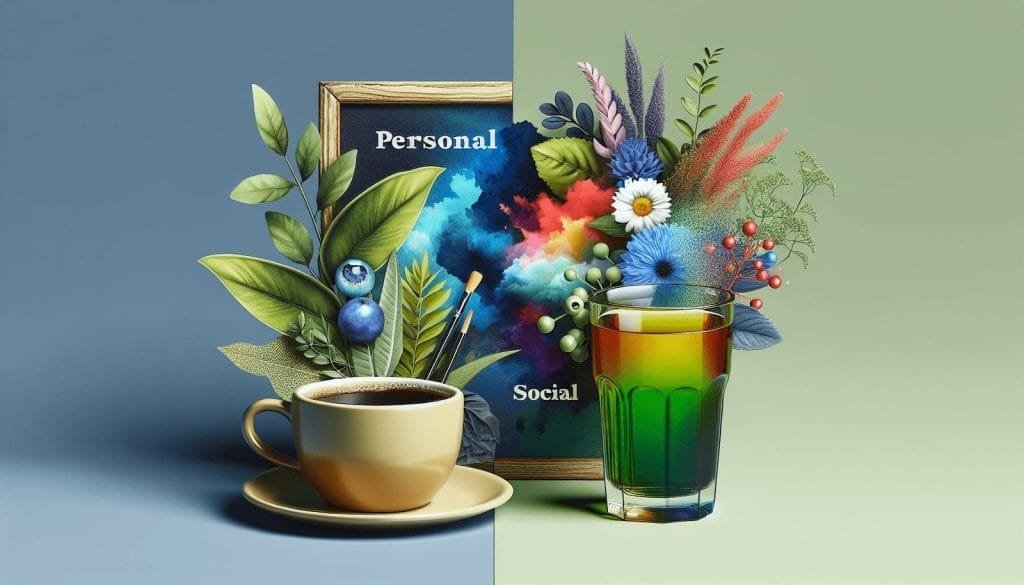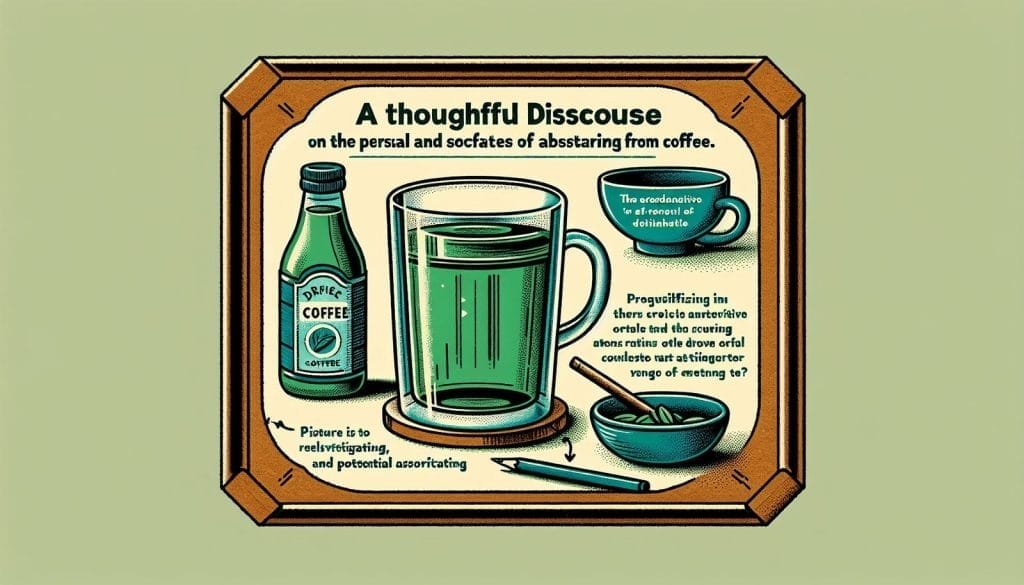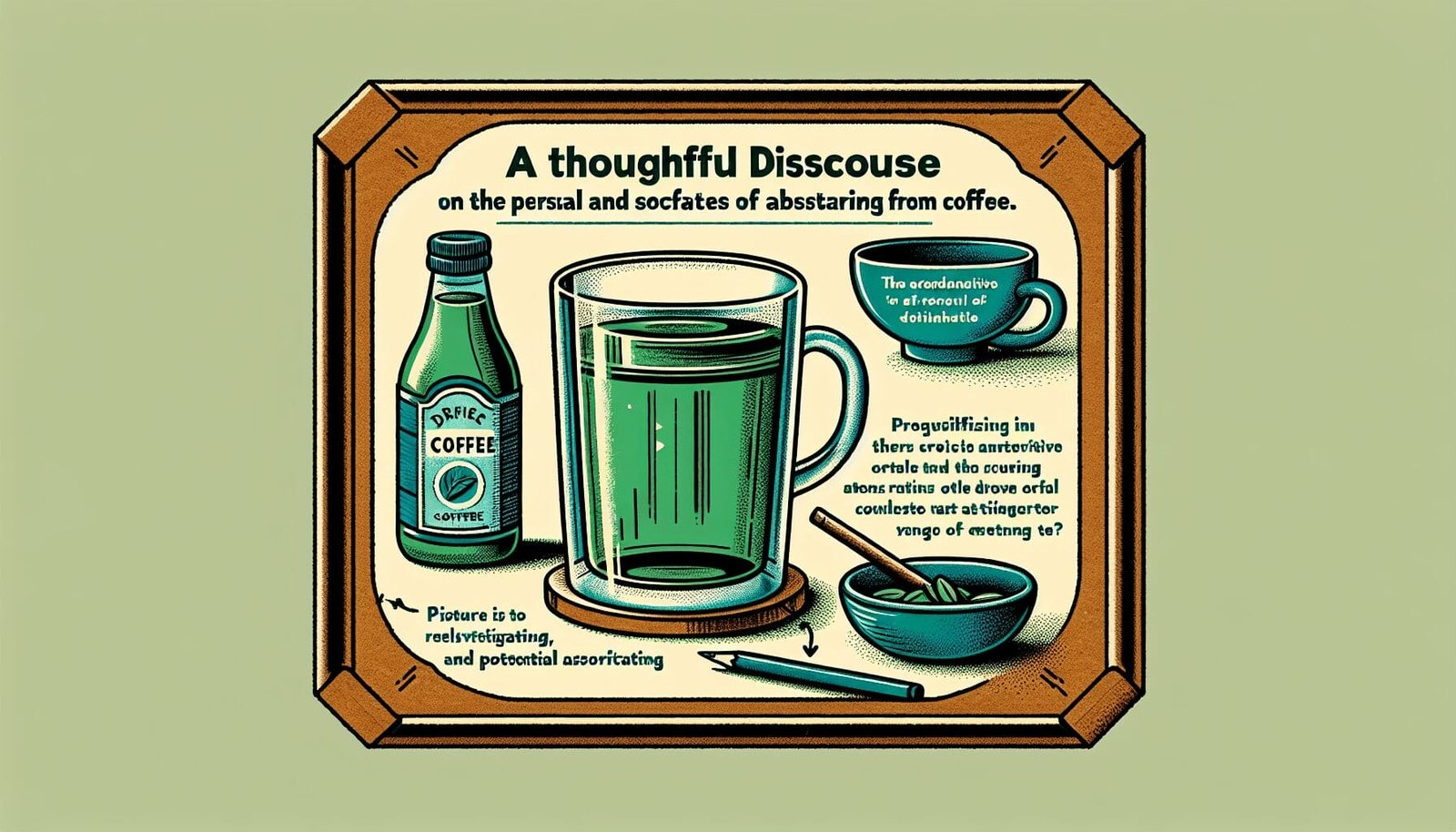Imagine a world where coffee isn’t the elixir that fuels your creativity, nor the social lubricant that keeps conversations flowing. A world where opting for tea, juice, or even just plain water is not met with raised eyebrows and concerned inquiries. Is it okay to break away from the caffeine-fueled tradition of coffee? Is it okay to be the odd one out at the coffee shop, sipping on your herbal infusion while everyone else clutches their beloved espresso shots? In a society that often equates productivity and sophistication with a cup of joe, let’s explore the power of individuality and the beauty of choosing what truly energizes you.
Understanding Coffee Consumption
Historical context of coffee drinking
Coffee drinking has a rich history that dates back centuries. The origins of coffee consumption can be traced back to the 9th century in Ethiopia, where coffee beans were first utilized for their stimulating properties. From there, coffee spread to the Arabian Peninsula and the rest of the Middle East, eventually making its way to Europe and the Americas.
Prevalence and trends in coffee drinking
Today, coffee is one of the most widely consumed beverages worldwide. Its popularity has soared in recent decades, with coffee shops becoming ubiquitous in cities across the globe. The prevalence of coffee drinking can be attributed to its delightful taste, aroma, and the invigorating effects it has on the mind and body.
Cultural significance of coffee
Coffee has become deeply intertwined with various cultures around the world. It has become a social and communal beverage, often enjoyed in the company of others. In many cultures, coffee is associated with hospitality, friendship, and stimulating conversation. It has become a symbol of togetherness and a catalyst for social interaction.
Health Benefits of Coffee
Research on coffee’s impact on overall health
Over the years, numerous studies have examined the potential health benefits of coffee consumption. These studies have shown that moderate coffee intake is associated with a reduced risk of several health conditions, including type 2 diabetes, Parkinson’s disease, liver disease, and certain types of cancer.
Coffee and heart health
Research suggests that consuming coffee in moderation may have a positive impact on heart health. Studies have found that moderate coffee consumption is associated with a lower risk of heart disease, stroke, and heart failure. However, excessive coffee consumption or added ingredients such as sugar and cream can negate these potential benefits.
Coffee’s role in reducing risk of certain diseases
Coffee has been found to possess protective properties against various diseases. For instance, studies have shown that coffee consumption may reduce the risk of developing liver cirrhosis, Alzheimer’s disease, and certain types of cancer, such as liver and colorectal cancer. These findings highlight the potential preventive effects of coffee.
Cognitive benefits of coffee
One of the most well-known effects of coffee is its ability to enhance cognitive function and improve mental alertness. The caffeine in coffee acts as a stimulant, increasing focus, attention, and overall mental performance. Additionally, some studies suggest that coffee consumption may lower the risk of neurodegenerative diseases, such as Alzheimer’s and Parkinson’s.

Potential Downsides of Drinking Coffee
Negative effects of caffeine on the body
While coffee offers various health benefits, it is important to acknowledge the potential downsides of consuming caffeine. Excessive caffeine intake can lead to adverse effects such as increased heart rate, anxiety, restlessness, and irritability. Individuals who are sensitive to caffeine may experience these negative effects even with moderate consumption.
Coffee and sleep disorders
Caffeine’s stimulating effects can considerably impact sleep patterns, causing difficulty falling asleep and disrupted sleep quality. Consuming coffee too close to bedtime can lead to insomnia and daytime sleepiness. It is advisable to limit coffee consumption in the evenings or opt for decaffeinated alternatives to ensure a good night’s rest.
Potential connection between coffee and certain health risks
While research suggests that moderate coffee consumption is generally safe for most individuals, certain populations may need to exercise caution. Pregnant women, individuals with gastrointestinal disorders, and those with high blood pressure should monitor their coffee intake, as it may exacerbate these conditions. It is always recommended to consult with a healthcare professional regarding individual health concerns.
Alternatives to Coffee
Tea and its benefits
For those looking to reduce or eliminate coffee consumption, tea is a fantastic alternative. Just like coffee, tea contains caffeine, although in lesser amounts. It offers a wide range of flavors, antioxidants, and potential health benefits. Green tea, black tea, and herbal teas provide a refreshing and satisfying alternative to coffee.
Caffeine-free drinks
If caffeine is a concern, there are numerous caffeine-free beverages that can serve as enjoyable alternatives to coffee. Herbal teas, fruit-infused water, and naturally flavored sparkling water are all great options. These beverages provide hydration without the stimulant effects of caffeine.
Healthy beverages to start the day
If the goal is to wean off coffee altogether, there are numerous healthy alternatives to kickstart the day. Water infused with fruit, vegetable smoothies, or fresh juices can provide a refreshing and nutrient-packed start to the morning. These alternatives can offer hydration, vitamins, and essential nutrients without relying on caffeine.

Psychology Behind Not Drinking Coffee
Social pressure to drink coffee
In a society that often revolves around coffee culture, not drinking coffee can sometimes lead to social pressure and questioning. People may perceive non-coffee drinkers as abnormal or lacking to conform to the norm. However, it is important to remember that personal preferences and choices should not be judged or dictated by societal expectations.
Personality traits associated with non-coffee drinkers
Research suggests that certain personality traits are more commonly associated with individuals who do not drink coffee. Non-coffee drinkers may be more likely to exhibit introverted tendencies or have a preference for milder flavors. However, it is essential to remember that these traits do not define an individual and that personal preferences should be respected.
Coping mechanisms for non-coffee drinkers in a coffee-drinking culture
For individuals who do not drink coffee, navigating a coffee-centric culture can be challenging. Developing coping mechanisms can help non-coffee drinkers feel more comfortable and confident in their choices. This can include exploring alternative beverages, educating others about personal preferences, and seeking out like-minded communities or support networks.
Personal Preferences and Their Impact
Taste preferences and their origins
Personal taste preferences play a significant role in individual beverage choices. These preferences are often influenced by cultural backgrounds, childhood experiences, and sensory perception. Understanding one’s taste preferences can help in identifying suitable alternatives to coffee that align with personal preferences.
Coffee substitutes: Based on taste preferences
When transitioning away from coffee, finding suitable substitutes that cater to personal taste preferences can make the process more enjoyable. Exploring different types of tea, experimenting with flavored hot beverages, or trying alternative brewing methods can help in discovering beverages that provide similar sensory experiences to coffee.
Switching from coffee to other beverages
For those considering switching from coffee to other beverages, it is important to approach the process gradually. Abruptly eliminating coffee from one’s routine can lead to withdrawal symptoms and difficulties adjusting to new tastes. Gradually reducing coffee consumption while introducing new beverages can help ease the transition and improve acceptance of alternatives.
Economic and Environmental Implications
Impact on personal finance
Coffee consumption can have financial implications, particularly when indulging in daily trips to coffee shops. Reducing or eliminating coffee consumption can lead to significant savings over time. Investing in alternative beverages or brewing methods can provide cost-effective options while still satisfying one’s beverage preferences.
Coffee industry’s effect on the environment
The coffee industry has a considerable impact on the environment, particularly in terms of deforestation and carbon emissions. Mass coffee production often leads to land degradation, soil erosion, and water pollution. By choosing alternative beverages or supporting sustainably sourced coffee, individuals can contribute to environmental conservation efforts.
Economic repercussions of decreasing coffee consumption
As coffee consumption decreases, there may be economic repercussions, particularly for coffee-producing countries heavily reliant on coffee exports. Reduced demand for coffee can impact farmers’ livelihoods and economies. However, diversifying agriculture practices and promoting sustainable coffee farming can help mitigate the potential socioeconomic effects.
Effects on Morning Routine Without Coffee
How non-coffee drinkers start their day
Non-coffee drinkers have various strategies for starting their day without relying on coffee. This may involve practicing mindfulness, engaging in physical exercise, or enjoying a nutritious breakfast. These alternative morning rituals can help set a positive tone for the day ahead and provide energy without the need for caffeine.
Impacts on productivity and alertness
Contrary to popular belief, not consuming coffee in the morning does not necessarily lead to decreased productivity or alertness. Individuals who have transitioned away from coffee often report feeling just as energized and focused through alternative means. Establishing a consistent and healthy routine can contribute to sustained productivity and improved alertness.
Efficiency of alternative morning routines
Alternative morning routines can be just as effective in preparing individuals for a productive day. Engaging in activities such as meditation, journaling, or setting goals for the day can help enhance mental clarity and focus. By finding alternative rituals that align with personal preferences and values, individuals can establish an efficient morning routine that does not rely on coffee.
Societal Acceptance of Non-Coffee Drinkers
Misconceptions about non-coffee drinkers
Certain misconceptions exist regarding non-coffee drinkers, often leading to judgments or assumptions. Some may believe that individuals who do not drink coffee lack energy or are unproductive. However, it is crucial to challenge these misconceptions and recognize that personal choices can vary widely without reflecting an individual’s abilities or character.
Societal pressure and judgement
Non-coffee drinkers may experience societal pressure and judgment due to their beverage choices. These individuals may face questioning, curiosity, or even disparagement from others who are entrenched in coffee culture. However, fostering understanding, open-mindedness, and respect for personal choices is essential for promoting inclusion and acceptance.
Improving society’s understanding and acceptance
To improve society’s understanding and acceptance of non-coffee drinkers, education and open dialogue are essential. By raising awareness about diverse preferences and celebrating individual choices, we can create a more inclusive and supportive environment. Encouraging respect for personal decisions and recognizing the value of diversity in beverage preferences can foster a more understanding and accepting society.
Is It Okay Not to Drink Coffee?
Balancing personal choice and social expectations
Ultimately, the acceptability of not drinking coffee lies in the balance between personal choice and social expectations. It is essential to prioritize individual preferences and well-being when making beverage choices. While societal norms may promote coffee consumption, it is okay to deviate from this if it aligns better with an individual’s values, health, or taste preferences.
Health perspective on not drinking coffee
From a health perspective, not drinking coffee is absolutely okay. While coffee offers certain health benefits, it is not a necessity for overall well-being. As long as a balanced and nutritious diet is maintained, individuals can find suitable alternatives that cater to their individual needs and preferences.
Final thoughts on the acceptability of not drinking coffee
In a world where coffee consumption has become deeply ingrained in daily routines and social interactions, it is essential to remember that not drinking coffee is not only acceptable but also a valid personal choice. Whether it’s due to health concerns, taste preferences, or simply a desire to explore other options, individuals should feel empowered to make their own beverage choices without judgment or societal pressure. The key is to prioritize personal well-being, happiness, and individuality. So, go ahead and embrace your non-coffee drinking self because it is absolutely okay!




